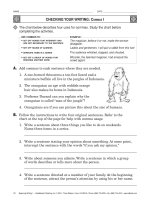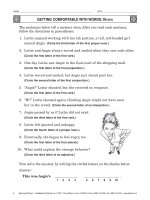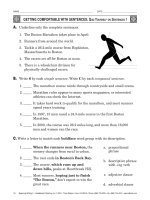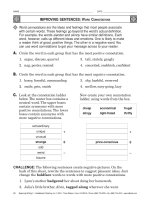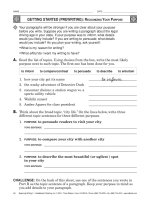Tài liệu Beginning writing 2 part 10 pptx
Bạn đang xem bản rút gọn của tài liệu. Xem và tải ngay bản đầy đủ của tài liệu tại đây (127.11 KB, 10 trang )
78
Beginning Writing 2
• Saddleback Publishing, Inc. © 2001 • Three Watson, Irvine, CA 92618 • Phone: (888) 735-2225 • Fax: (888) 734-4010 • www.sdlback.com
NAME DATE
Imagine a character and write a description on the lines below. In creating
your character, it may help you to think of real people you’ve known.
____________________________________________________________________
_______________________________________________________________________
_______________________________________________________________________
_______________________________________________________________________
_______________________________________________________________________
_______________________________________________________________________
_______________________________________________________________________
B.
Writers also build characters by having them do certain things. For example,
readers would probably feel differently about a character who volunteers
at a hospital than about one who steals lunch money from neighborhood
children. On the lines below, write a paragraph in which the character you
described above does something. The action should help readers understand
the character. Begin your paragraph by completing the following sentence:
____________________________________________________________________
_______________________________________________________________________
_______________________________________________________________________
_______________________________________________________________________
_______________________________________________________________________
_______________________________________________________________________
_______________________________________________________________________
CHALLENGE:
On the back of this sheet, sketch your character or find a picture in
a magazine or newspaper that looks something like your character.
was no ordinary person!
I never really knew until the day
when she (he)
• Call upon all your senses to
imagine a character.
• Exaggerate characteristics to
make the character interesting.
• Describe both physical characteristics
and personality traits.
• Use positive or negative words to make
your reader like or dislike the character.
WRITING A STORY: C
REATING
C
HARACTERS
Characters
are the
imaginary people in a story. Good writers provide details that
help their readers “know” story characters and care about them.
A.
One way to build a character is to present a detailed description of him or her.
HINTS FOR WRITING A CHARACTER DESCRIPTION:
Saddleback Publishing, Inc. © 2001 • Three Watson, Irvine, CA 92618 • Phone: (888) 735-2225 • Fax: (888) 734-4010 • www.sdlback.com •
Beginning Writing 2
79
NAME DATE
WRITING A STORY: D
IALOGUE
IN
S
TORIES
Dialogue
is conversation between characters. By adding dialogue, writers can build
a character’s personality.
A.
First read what the character says. Then complete each sentence with an
adjective or descriptive phrase to describe each speaker. The first one has
been done for you.
1. “Hey, buddy,” Waldo threatened, “take that last piece of pizza
and you’ll be sorry!”
Waldo is ___________________________________________________________.
2. “It’s not fair, Mom!” Kirsten cried. “I only got one piece of pizza.
Now it’s all gone, and I’m still hungry. Billy got more than me.
You must like him better!”
Kirsten is _________________________________________________________.
3. “Excuse me, ma’am,” Winston said. “The bus is crowded, and I see
you have an armful of packages. Why don’t you take my seat?”
Winston is _________________________________________________________.
4. “Keep that mutt off my lawn!” Mr. Maloney bellowed.
Mr. Maloney is _____________________________________________________.
5. “I’d appreciate it if you kept your pup in your yard while my new
lawn is growing in,” Ms. Cohen requested.
Ms. Cohen is _______________________________________________________.
B.
Characters’ names can help readers create a mental image. Notice the
picture that forms in your mind when you read each name.
Edna Buford Sergeant Rock Dansforth Clyde Klupner
Muffy Malloy Francis Farnsworth III Butch Riley
April Sundancer Ms. Rebecca VanFleet Bitsey La Flamme
Select two of the characters listed above. Then, on the back of this sheet,
write a conversation between them. Let the dialogue reflect each character’s
personality. Don’t forget to use quotation marks!
The following situations might give you some ideas:
a rude, selfish bully
• a police officer stopping someone
suspected of shoplifting
• a substitute teacher and a rowdy student
• a teenager meeting a blind date
• a customer returning an item to a
store clerk
80
Beginning Writing 2
• Saddleback Publishing, Inc. © 2001 • Three Watson, Irvine, CA 92618 • Phone: (888) 735-2225 • Fax: (888) 734-4010 • www.sdlback.com
NAME DATE
WRITING A STORY: P
OINT
OF
V
IEW
Writers may choose to present a story from an unusual point of view. This can
result in an imaginative tale!
FACTS TO REMEMBER ABOUT POINT OF VIEW:
• first-person point of view = narrator (person telling the story) is a character in the story;
uses pronouns
I, me, my, we
• third-person point of view = narrator is outside the story; uses the pronouns
he, she, they
Each passage below is written from the first-person point of view. It is told
by an unusual, non-human narrator. Write a letter by each number to match
each passage with a narrator.
NARRATORS
a. illegally parked car b. snowman c. baseball d. mud puddle
1. _____ I live to be smacked in the face. Nothing I like better than a good
solid whack! I’ve been whacked by the best of them—Hank Aaron,
Ken Griffey Jr., Mark McGwire. My grandfather was even whacked
by Babe Ruth!
2. _____ Don’t take me away! I wasn’t doing anything wrong! I was just
sitting here minding my own business. I swear I didn’t see the
sign. This looked like a perfectly good spot to rest. Was I bothering
anybody? Was I in anyone’s way? Hey, where are you taking me?
3. _____ Hey, little boy, come over here and play with me! We’ll have a good
time. I can promise you gooey, icky, sloppy fun. I’m bored down here
all alone. Oh, don’t worry—your mother won’t mind one bit!
4. _____ My goodness, but it’s warm today! Downright hot, I’d say. I can
just see the thermometer on the side of the house, and it looks
like it’s about 34 degrees! I wish I weren’t wearing this wool hat
and scarf. Whoops, I think my nose just fell off! There goes an
eye! I’m losing inches fast. Everything is getting blurry. It’s all
fading . . . fading . . . fading. . . .
CHALLENGE:
Now call on your own imagination! On the back of this sheet,
write a passage from the point of view of one of the following:
an alarm clock pet dog or cat NBA basketball
gangster’s gun dentist’s drill seagull
Stretch your creativity by adding an illustration after the passage.
Saddleback Publishing, Inc. © 2001 • Three Watson, Irvine, CA 92618 • Phone: (888) 735-2225 • Fax: (888) 734-4010 • www.sdlback.com •
Beginning Writing 2
81
NAME DATE
WRITING A STORY: P
LOT
E
VENTS
Have you ever noticed that a chain of events always leads to the outcome of a
story? These events make up the story’s
plot
. The plot is what happens to resolve
the conflict.
A.
Writers usually present story events in the order they happened. First read
the conflict described below. Notice that the events that follow are out of
order. Number the events to show the order in which they logically occurred.
CONFLICT:
Laurie and many of her friends are dog owners. Laurie’s
friends have expensive, purebred dogs. They talk about the fine traits
of their breeds, their days at obedience school, and the ribbons they’ve
won in dog shows. Laurie’s dog Bill is a shaggy, naughty pooch from the
pound. Sometimes Laurie is embarrassed by her disobedient mutt.
EVENTS:
_____ A wandering toddler falls into the lake.
_____ Bill chomps onto the child’s jacket and swims with him to safety.
_____ Bill sees the accident and heads straight for the water.
_____ Laurie and her friends take their dogs to the park.
_____ Bill jumps in and swims to the struggling child.
_____ As Bill runs to the rescue, the other dogs bark in confusion.
OUTCOME:
Laurie proudly accepts praise for her dog-hero and realizes that
her goofy mutt Bill is the greatest pet of all.
B.
Think of a story you’ve read or seen on television. Write a sentence
describing the conflict of the story. Then write sentences describing
the main events and the final outcome.
NAME OF STORY OR TV SHOW:
_______________________________________________
CONFLICT:
______________________________________________________________
_____________________________________________________________________
_____________________________________________________________________
_____________________________________________________________________
EVENTS:
________________________________________________________________
_____________________________________________________________________
_____________________________________________________________________
_____________________________________________________________________
_____________________________________________________________________
OUTCOME:
______________________________________________________________
_____________________________________________________________________
82
Beginning Writing 2
• Saddleback Publishing, Inc. © 2001 • Three Watson, Irvine, CA 92618 • Phone: (888) 735-2225 • Fax: (888) 734-4010 • www.sdlback.com
NAME DATE
WRITING A STORY: R
EVIEW
P
UZZLE
Read the beginning passage from the short story
below. The boldface words are numbered to help
you recognize story elements. After you read the
story, unscramble the letters to spell the story
element. The first one has been done for you.
(1) GOING FOR GOLD
(2) In 1898, Dawson, Alaska, was the
best place for a guy to try his luck. That’s
what (3) Butch Ledeaux was led to believe.
(4) He arrived in Dawson looking for money and
adventure. He found a hard-living, gunslinging, rowdy bunch of men
who aimed to get rich quick by any means. (5) An icy wind swept cigar
butts and tin cans into the gutter of the dirty street. The winter sun
made a weak try at peeking through the threatening storm clouds.
Butch rented a room in a dingy boarding house. He sat on the sagging
bed and counted the money he usually kept tied in an old woolen sock.
It was every cent the 18-year-old had saved! It was enough to buy a
sled, a few dogs, and the gear he needed to find gold and strike a claim.
The exhausted young man soon fell asleep.
Butch slept soundly—too soundly! He didn’t hear the rattle at the
lock. He didn’t see shadowy figures steal into his room. When a red
dawn woke Butch, he knew immediately that something was wrong.
He reached under the mattress and felt for his money sock. (6) It was
gone! He was alone among strangers and totally broke!
1. L I T E T ___ ___ ___ ___ ___
2. G T E T S N I ___ ___ ___ ___ ___ ___ ___
3. H R A T C A C R E ___ ___ ___ ___ ___ ___ ___ ___ ___
4. N O I T P F O E W I V ___ ___ ___ ___ ___ ___ ___ ___ ___ ___ ___
5. O D O M ___ ___ ___ ___
6. F O N T C L I C ___ ___ ___ ___ ___ ___ ___ ___
TITLE
